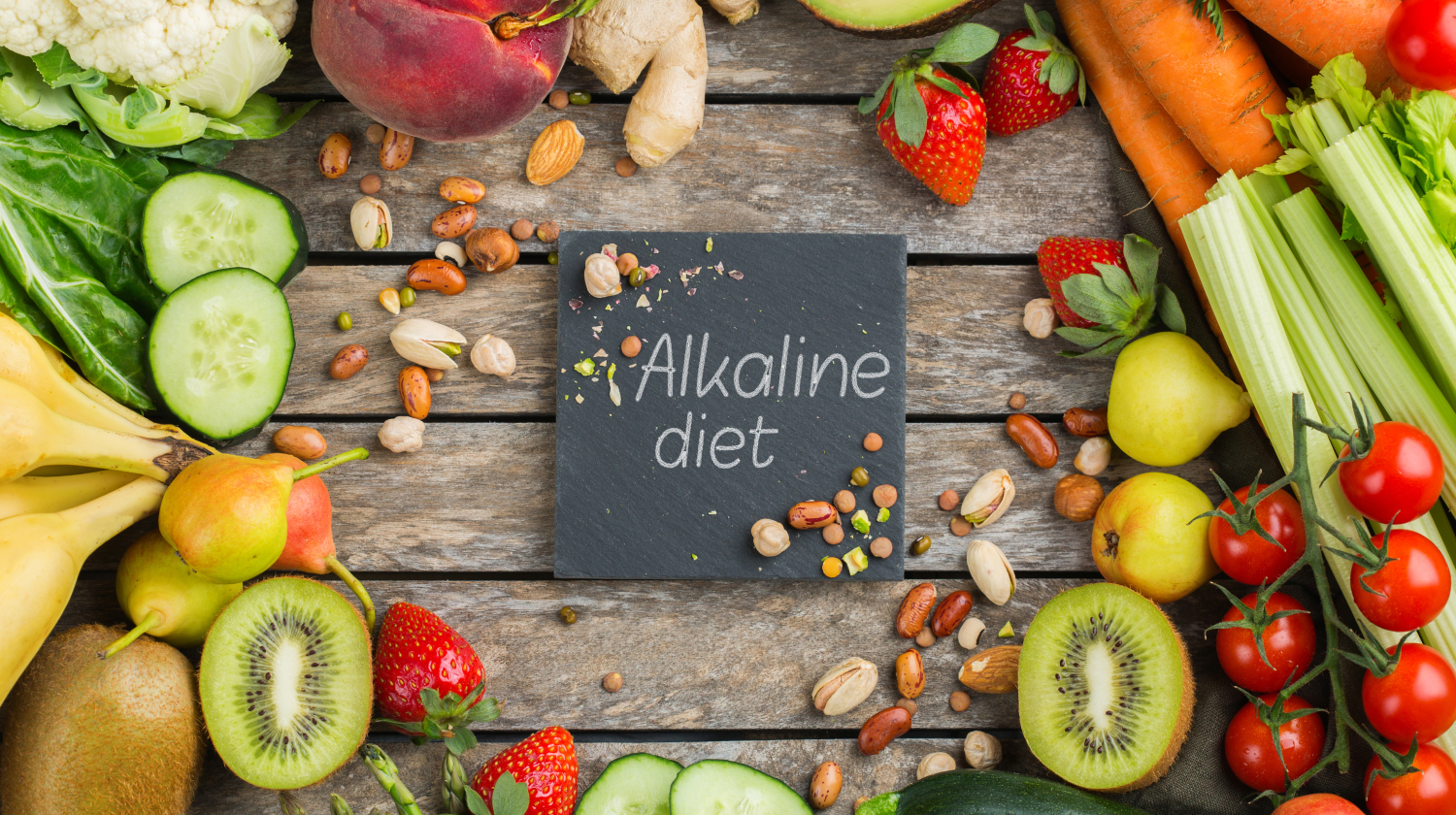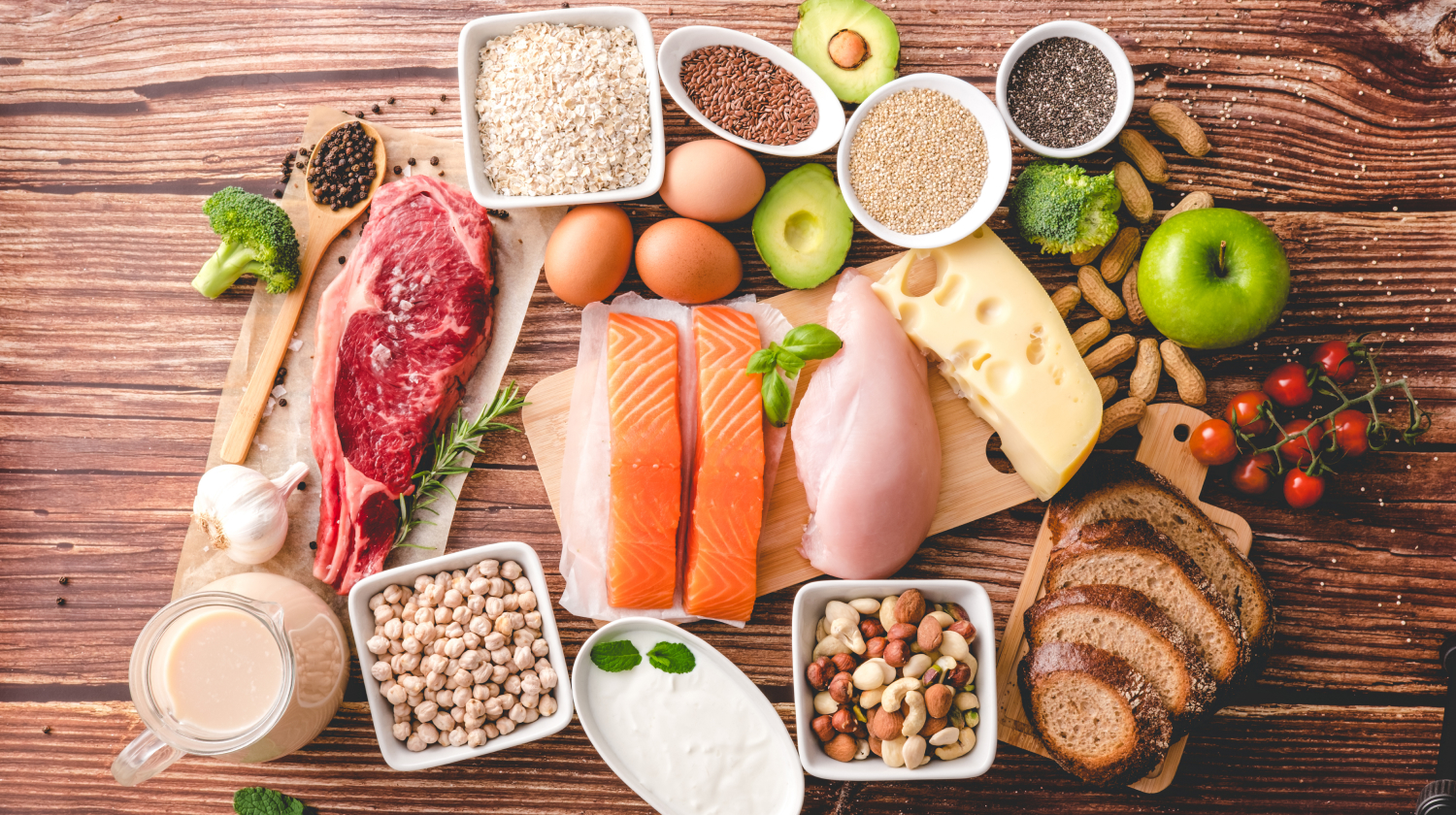Alkaline Diet For Beginners: Things You Need To Know 2024

There are infinite alkaline diet plans on the internet promising to cure you of various ailments, help you lose weight, and even treat cancer. But is it true?
Eating more alkaline foods is said to counter the effects of the standard Western diet, which is high in acidic foods and low in fruits and vegetables, which provide alkali salts. Consumption of too many acidic foods can lead to low-grade metabolic acidosis, a risk factor for various chronic diseases such as cardiovascular disease, type-2 diabetes, and increased cancer risk.[1]
But is there really evidence that an alkaline diet can improve your health, or is it just media hype? Read on to find out whether an alkaline diet actually works.
What Is The Alkaline Diet?
An alkaline diet is high in alkaline foods, which are said to increase the body’s pH, and low in acidic foods, which are said to reduce pH. pH is the measure used to indicate relative acidity: pH 0-6.9 is acidic; ph 7.1 and higher is alkaline; and a pH of 7 is neutral. Pure water, for example, has a pH of 7.
All animal-based proteins, such as meat, dairy, and eggs, increase the amount of acid in the diet, i.e., the acid load. On the flip side, the most alkaline diet is a plant-based diet. Plant foods are rich in alkaline potassium and magnesium salts and therefore have a significantly lower dietary acid load[2] than a meat-based diet.
However, the pH of the human body is tightly regulated and so-called acid-forming foods and alkaline foods only affect the urine pH, not the blood pH or the pH of the rest of the body.
If that’s the case, does eating an alkaline diet actually work, and – if so – how does it work?
How Does The Alkaline Diet Work?
Studies show that high dietary acid load scores are associated with an increased risk of multiple chronic diseases.[3] Lowering the acid load of the diet – by following the alkaline diet, for example – seems to improve overall health.
However, it’s important to note that there are lots of confounding variables and it’s difficult to get balanced answers. In fact, most positive health outcomes might have nothing at all to do with your diet’s acid-alkaline balance.
For example, those following a low-acid-load diet consume significantly more health-promoting dietary fiber,[4] have a more favorable potassium-to-sodium ratio, and eat less saturated fat, all of which have positive health benefits. So low-acid diets have health benefits unrelated to acid load.
Nevertheless, what are the potential benefits of following the alkaline diet?
Health Benefits Of Alkaline Diet
Reduces Cancer Risk
A 2022 meta-analysis found that a high dietary acid load might be associated with an increased cancer incidence.[5] In fact, compared to those with the lowest acid intake, those with the highest acid intake had a 66% increased risk of cancer.
Similarly, another 2022 meta-analysis found that a high dietary acid load might be associated with a worse cancer prognosis.[6]
However, although the alkaline diet gained popularity in the media for use against cancer, there’s no actual scientific evidence of dietary intervention[7] to back up these claims. Another systematic review found no evidence of any impact of reducing the acid load of the diet or the use of alkaline water on cancer treatment.[8]
So it might not be due to the acid itself but, rather, that foods such as red meat increase the risk of cancer besides the acid load of the diet. So while red meat has been casually linked to promoting cancer risk, it may not be the acid effect or it may be the acid effect combined with other factors.
Might Reduce Bone Loss In Weight Loss
In general, the effect of dietary acid load on bone health is conflicting,[9] and there’s no consensus on whether acid load affects bone mineral density.
Contrary to popular opinion, one meta-analysis found no evidence that higher intakes of acidic foods,[10] such as meat or dairy, have a detrimental effect on bone health. It turns out that a higher intake of acidic phosphates was actually associated with increased calcium retention – the opposite of what was expected.
But, when it comes to weight-loss-induced bone loss, there does seem to be a significant effect.
High protein diets can promote weight loss, but weight loss can also trigger bone mineral loss.[11] Total protein intake doesn’t seem to affect bone loss, but the type of protein might matter.
One study in rats found that, compared to a soy-based diet, a high-protein diet with beef increased weight loss-induced bone loss.[12] A high-protein milk-based diet didn’t have any effect on bone loss.
This suggests that the type of protein is important to prevent weight-loss-induced bone loss, with red meat being the worst and soy being the best. However, we need more studies in humans to confirm this effect of protein type on bone mineral loss.
Improves Kidney Function In Chronic Kidney Disease
Acid-base balance is a big problem[13] for kidney disease patients, which increases the risk of metabolic acidosis[14] — a severe complication that accelerates the loss of kidney function.
But this doesn’t have to be the case. Studies suggest acidosis can be mitigated with a plant-focused alkaline diet. According to a number of studies, the Mediterranean diet is best in the early stages of chronic kidney disease, while a low-protein vegan diet is more helpful in advanced kidney disease.
Indeed, kidney disease patients are usually instructed to consume a low-protein diet,[15] especially avoiding proteins high in acidic phosphorus,[16] such as eggs. On the other hand, studies suggest that a diet rich in fruits and vegetables lowers the dietary acid load and slows the decline of kidney function.[17]
Might Lower The Risk Of Type 2 Diabetes
A higher acid diet load is associated with higher fasting blood glucose,[18] potentially increasing the risk of type 2 diabetes. However, studies have shown that alkalizing medications taken with a meal have no acute effect on blood sugar or insulin response.[19]
So could an alkaline diet help? Well, long-term lowering of acid load might help prevent type 2 diabetes.[20] Nevertheless, although limited evidence suggests that higher acid load might contribute to impaired blood sugar balance, we still need more evidence for the effect of dietary changes.
Lowers Urine pH
Uric acid urolithiasis causes up to 10% of urinary stones[21] and tends to form in those with a urine pH less than 5.5.
Could the alkaline diet help? Studies suggest that supplementing alkaline water might promote urine alkalization,[22] particularly in individuals with a lower urine pH. However, strangely, this effect was only significant in males.
And what about the effect of lowering urine pH on urinary tract infections? Over-the-counter alkalizing agents can be harmful to those with UTIs because they can interfere with the antibiotic treatment[23] of the infection.
What’s more, there’s no evidence that urine alkalization reduces the risk of UTIs[24] – nor does an alkaline diet. A 2022 study found no association between dietary acid load, urine pH, and the occurrence of UTIs.[25]
Hence, lowering the acid load of the diet might be the safest way to reduce urine pH[26] and increase uric acid excretion, but we still need more evidence for the impact on UTI risk.
Side Effects
As long as you follow a healthy nutritionally-balanced low-acid-load diet, such as a whole-food plant-based diet, there should be minimal side effects from following an alkaline diet.
However, some alkaline diet plans on the Internet might have harmful side effects such as:
- Promoting a protein deficiency.
- Increasing the risk of vitamin D and calcium deficiencies.[27]
- Gastrointestinal symptoms due to the increase in fiber consumption.
Alkaline Diet Foods List: What To Eat & Avoid
Foods To Eat

While following an alkaline diet, you should eat mostly alkaline foods as part of a balanced diet. Try eating foods such as:
- Fresh fruits and vegetables.
- Dried fruits, such as dried apricots.
- Plant-based protein sources, such as soy.
- Plant-based healthy fats.
- Whole grains, which are considered neutral foods.
The Mediterranean diet is a good example of a balanced diet rich in alkaline-forming foods.
Foods To Avoid

On the alkaline diet, you will be recommended to avoid acidic foods and acid-forming foods, such as:
- Animal protein.
- Meat.
- Fish.
- Eggs.
- Dairy products.
- Processed foods.
- Refined fats.
- Sugar.
Final Thought
Alkaline diets — also called the alkaline-ash diet — are said to promote pH balance and better health. Proponents of the alkaline diet claim that an acidic environment in the human body increases the risk of chronic health conditions such as cancer and type 2 diabetes.
However, the alkaline diet only changes the pH of the urine, not blood pH or that of the rest of the body, so some effects of the acid-alkaline diet are over-attributed to pH balance. Nevertheless, in some cases, it is important to eat certain foods to increase the pH levels of the urine, such as in chronic kidney disease or uric acid urolithiasis.
In all other cases, such as cancer and type 2 diabetes, it’s rather the effect of eating more healthy foods and less meat and processed foods that improve health. An alkaline diet tends to be low in animal and processed foods, which are said to be acid-forming, and high in more alkaline plant-based foods such as fruits and vegetables.
+ 27 sources
Health Canal avoids using tertiary references. We have strict sourcing guidelines and rely on peer-reviewed studies, academic researches from medical associations and institutions. To ensure the accuracy of articles in Health Canal, you can read more about the editorial process here
- Storz, M.A. and Ronco, A.L. (2022). Reduced dietary acid load in U.S. vegetarian adults: Results from the National Health and Nutrition Examination Survey. Food Science & Nutrition, [online] 10(6), pp.2091–2100. doi:10.1002/fsn3.2825.
- Storz, M.A., Ronco, A.L. and Hannibal, L. (2022). Observational and clinical evidence that plant-based nutrition reduces dietary acid load. Journal of Nutritional Science, [online] 11. doi:10.1017/jns.2022.93.
- Storz, M.A. (2022). Health Inequities in the USA: a Role for Dietary Acid Load? Results from the National Health and Nutrition Examination Surveys. Journal of Racial and Ethnic Health Disparities. [online] doi:10.1007/s40615-022-01462-9.
- Storz, M.A. and Ronco, A.L. (2023). How Well Do Low-PRAL Diets Fare in Comparison to the 2020–2025 Dietary Guidelines for Americans? Healthcare, [online] 11(2), p.180. doi:10.3390/healthcare11020180.
- Keramati, M., Kheirouri, S., Musazadeh, V. and Alizadeh, M. (2022). Association of High Dietary Acid Load With the Risk of Cancer: A Systematic Review and Meta-Analysis of Observational Studies. Frontiers in Nutrition, [online] 9. doi:10.3389/fnut.2022.816797.
- Wang, R., Wen, Z.-Y., Liu, F.-H., Wei, Y.-F., Xu, H.-L., Sun, M.-L., Zhao, Y.-H., Gong, T.-T., Wang, H.-H. and Wu, Q.-J. (2022). Association between dietary acid load and cancer risk and prognosis: An updated systematic review and meta-analysis of observational studies. Frontiers in Nutrition, [online] 9. doi:10.3389/fnut.2022.891936.
- Hamaguchi, R., Isowa, M., Narui, R., Morikawa, H. and Wada, H. (2022). Clinical review of alkalization therapy in cancer treatment. Frontiers in Oncology, [online] 12. doi:10.3389/fonc.2022.1003588.
- Fenton, T.R. and Huang, T. (2016). Systematic review of the association between dietary acid load, alkaline water and cancer. BMJ Open, [online] 6(6), p.e010438. doi:10.1136/bmjopen-2015-010438.
- Gholami, F., Naghshi, S., Samadi, M., Rasaei, N. and Mirzaei, K. (2022). Dietary Acid Load and Bone Health: A Systematic Review and Meta-Analysis of Observational Studies. Frontiers in Nutrition, [online] 9. doi:10.3389/fnut.2022.869132.
- Fenton, T.R., Lyon, A.W., Eliasziw, M., Tough, S.C. and Hanley, D.A. (2009). Phosphate decreases urine calcium and increases calcium balance: A meta-analysis of the osteoporosis acid-ash diet hypothesis. Nutrition Journal, [online] 8(1). doi:10.1186/1475-2891-8-41.
- Wright, C.S., Li, J. and Campbell, W.W. (2019). Effects of Dietary Protein Quantity on Bone Quantity following Weight Loss: A Systematic Review and Meta-analysis. Advances in Nutrition, [online] 10(6), pp.1089–1107. doi:10.1093/advances/nmz058.
- Wright, C.S., Hill, E.R., Reyes Fernandez, P.C., Thompson, W.R., Gallant, M.A., Campbell, W.W. and Main, R.P. (2022). Effects of Dietary Protein Source and Quantity on Bone Morphology and Body Composition Following a High-Protein Weight-Loss Diet in a Rat Model for Postmenopausal Obesity. Nutrients, [online] 14(11), p.2262. doi:10.3390/nu14112262.
- Wieliczko, M. and Małyszko, J. (2022). Acid–base balance in hemodialysis patients in everyday practice. Renal Failure, [online] 44(1), pp.1090–1097. doi:10.1080/0886022x.2022.2094805.
- Noce, A., Marrone, G., Wilson Jones, G., Di Lauro, M., Pietroboni Zaitseva, A., Ramadori, L., Celotto, R., Mitterhofer, A.P. and Di Daniele, N. (2021). Nutritional Approaches for the Management of Metabolic Acidosis in Chronic Kidney Disease. Nutrients, [online] 13(8), p.2534. doi:10.3390/nu13082534.
- Passey, C. (2017). Reducing the Dietary Acid Load: How a More Alkaline Diet Benefits Patients With Chronic Kidney Disease. Journal of Renal Nutrition, [online] 27(3), pp.151–160. doi:10.1053/j.jrn.2016.11.006.
- Tallman, D., Sahathevan, S., Karupaiah, T. and Khosla, P. (2018). Egg Intake in Chronic Kidney Disease. Nutrients, [online] 10(12), p.1945. doi:10.3390/nu10121945.
- Yari Z;Mirmiran P (2018). Alkaline Diet: a Novel Nutritional Strategy in Chronic Kidney Disease? Iranian journal of kidney diseases, [online] 12(4). Available at: https://pubmed.ncbi.nlm.nih.gov/30087214/
- Lim, S.Y., Chan, Y.M., Ramachandran, V., Shariff, Z.M., Chin, Y.S. and Arumugam, M. (2021). Dietary Acid Load and Its Interaction with IGF1 (rs35767 and rs7136446) and IL6 (rs1800796) Polymorphisms on Metabolic Traits among Postmenopausal Women. Nutrients, [online] 13(7), p.2161. doi:10.3390/nu13072161.
- Kozan, P., Blythe, J., Greenfield, J. and Samocha-Bonet, D. (2017). The Effect of Buffering High Acid Load Meal with Sodium Bicarbonate on Postprandial Glucose Metabolism in Humans—A Randomized Placebo-Controlled Study. Nutrients, [online] 9(8), p.861. doi:10.3390/nu9080861.
- Della Guardia, L., Thomas, M. and Cena, H. (2018). Insulin Sensitivity and Glucose Homeostasis Can Be Influenced by Metabolic Acid Load. Nutrients, [online] 10(5), p.618. doi:10.3390/nu10050618.
- Kamphuis, G.M., Wouter van Hattum, J., de Bie, P. and Somani, B.K. (2019). Method of alkalization and monitoring of urinary pH for prevention of recurrent uric acid urolithiasis: a systematic review. Translational Andrology and Urology, [online] 8(S4), pp.S448–S456. doi:10.21037/tau.2019.05.01.
- Zhang, G., Deng, T., Deng, R., Sun, X., He, Y. and Liu, Z. (2022). Baseline urine pH is related to effective urine alkalization by short-term alkaline water supplementation: data from a self-controlled study in healthy Chinese volunteers following a systematic review and meta-analysis of literature. Translational Andrology and Urology, [online] 11(5), pp.710–719. doi:10.21037/tau-22-280.
- Kavanagh, O.N. (2022). Alkalising agents in urinary tract infections: theoretical contraindications, interactions and synergy. Therapeutic Advances in Drug Safety, [online] 13, p.204209862210807. doi:10.1177/20420986221080794.
- Barea, B.M., Veeratterapillay, R. and Harding, C. (2020). Nonantibiotic treatments for urinary cystitis: an update. Current Opinion in Urology, [online] 30(6), pp.845–852. doi:10.1097/mou.0000000000000821.
- Fan, E., Chavez, J.A., Chavez, J.M., Christie, A.L. and Zimmern, P.E. (2022). Does Urinary pH and Diet Influence the Rate of Urinary Tract Infection Recurrence After Electrofulguration in Women With Antibiotic-Recalcitrant Recurrent Urinary Tract Infections? Urology, [online] 164, pp.94–99. doi:10.1016/j.urology.2022.01.021.
- Kanbara, A. and Seyama, I. (2011). Effect of Urine pH on Uric Acid Excretion by Manipulating Food Materials. Nucleosides, Nucleotides and Nucleic Acids, [online] 30(12), pp.1066–1071. doi:10.1080/15257770.2011.596498.
- Calello, D.P., Jefri, M., Yu, M., Zarraga, J., Bergamo, D. and Hamilton, R. (2021). Notes from the Field: Vitamin D–Deficient Rickets and Severe Hypocalcemia in Infants Fed Homemade Alkaline Diet Formula — Three States, August 2020–February 2021. MMWR. Morbidity and Mortality Weekly Report, [online] 70(33), pp.1124–1125. doi:10.15585/mmwr.mm7033a4.



